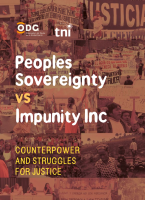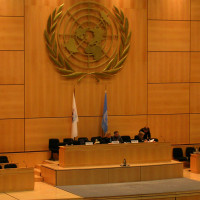8 Proposals for the Binding Treaty on Transnational Corporations and Human Rights
Topics
An international legally binding instrument on transnational corporations (TNCs) has the potential to substantially promote the protection and fulfilment of human rights in the long-term and on a global scale. It can contribute to ending the impunity that TNCs routinely enjoy for their human rights violations, especially in countries of the Global South, and to ensuring access to justice for the victims of their activities.

Downloads
In June 2014, the Human Rights Council adopted resolution 26/9 on the elaboration of an international legally binding instrument on transnational corporations (TNCs) and other business enterprises with respect to human rights. This is a historic achievement after decades of discussions and failed attempts within the United Nations. Such an instrument has the potential to substantially promote the protection and fulfilment of human rights in the long-term and on a global scale. It can contribute to ending the impunity that TNCs routinely enjoy for their human rights violations, especially in countries of the Global South, and to ensuring access to justice for the victims of their activities.
This submission contains eight proposals related to the nature, the scope, the form and the content of the future legally binding international instrument. It is submitted on behalf of the Global Campaign to Dismantle Corporate Power and Stop Impunity, an international network comprising over 200 social movements, networks, organizations, and representatives of victims and affected communities from all around the world. The Global Campaign was actively involved and facilitated the gathering of dozens of delegates in Geneva for a week of high profile mobilization during the Human Rights Council session in June 2014 to demand new binding norms on human rights and TNCs
Officially launched in Rio in 2012, the Global Campaign has been working on, among other things, a proposal for an International Peoples Treaty on the Control of TNCs. This proposal was built from the grass roots in 2013-2014 – from the recommendations of victims, affected communities and social movements and other civil society organizations in Africa, Asia, Latin America, Europe, the USA and Canada. The Peoples Treaty has two main pillars: proposals addressing legal challenges to corporate accountability and proposals on alternatives addressing the need for transformative systemic change of the current corporate economic model. This submission was developed on the basis of these proposals.
The proposals in short- The legally binding international instrument must focus on TNCs.
- The legally binding international instrument must affirm the obligation of TNCs to respect all human rights.
- The new legally binding international instrument must affirm the obligation of states to protect against human rights violations committed by TNCs and must codify their extra-territorial obligations in this regard.
- The legally binding international instrument must reaffirm the hierarchical superiority of human rights norms over trade and investment treaties and develop specific state obligations in this regard.
- The legally binding international treaty must establish the civil and criminal responsibility of TNCs and their executives, as well as the shared liability of TNCs for the activities of their subsidiaries, suppliers, licensees and subcontractors.
- The future legally binding international instrument must include provisions on the obligations of international and regional financial and economic institutions.
- Mechanisms must be established at the international level to enforce the treaty and monitor its implementation.
- Negotiations must be protected from corporate capture.



